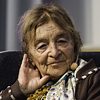USA & Hungary
Agnes Heller
Ágnes Heller was born to Jewish parents in the year 1929. During the National Socialist dictatorship, her father and many of her relatives were victims to persecution of the Jews, while she and her mother by chance repeatedly managed to narrowly escape deportation and murder.
After completing secondary school in 1947, she began studying physics and chemistry at the university in Budapest, but, impressed by a lecture held by György Lukács, she changed her major to philosophy. In 1955, she completed her doctorate under Lukács’s professorship and then became his assistant. In the following years, she belonged to the Budapest School, an oppositional group of intellectuals and philosophers centred on Lukács.
She quickly entered into a conflict with the ruling Communist party and was accused of a lack of allegiance. This was followed by her being banned from her profession, spied upon and finally her emigration to the west. From 1978 until 1983, Ágnes Heller was professor of sociology at La Trobe University in Melbourne. In 1988 she succeeded Hannah Arendt in the philosophy chair at the New School for Social Research in New York, where she taught until her retirement in 2009.
Heller is considered one of the most important philosophers of the 20th century. In her many writings, the favourite student and later assistant of György Lukács described the culture of Europe and always sought out dialogue with the great philosophical forerunners Kant, Nietzsche, Aristotle, Shakespeare and Kierkegaard. In doing so, she produced a very remarkable, multilingual oeuvre.
She has received many awards including the Lessing Prize of the City of Hamburg (1981), the Hannah Arendt Prize of the City of Bremen (1996), the Silver Cross of the Hungarian Republic (2004) and Denmark’s most distinguished cultural award, the Sonning Cultural Prize (2006). In 2008, she became an honorary citizen of Budapest. Since her retirement, Ágnes Heller lived half the year in Budapest and half in New York.
Agnes Heller died on 19.07.2019, having lived an extraordinary life, spanning 90 years.
